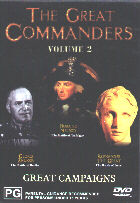 |
 |
 |
|
DOCUMENTARIES The Great Commanders 2Horatio Nelson, Alexander the Great, Georgi Zhukov
In its examination of Nelson, the television series The Great Commanders follows his extraordinary career from his early years at sea, the meteoric rise to captain - by the unheard of age of 20 - and his date with destiny at Trafalgar. Filled with some terrific images of naval warfare in the times of fighting sail and Nelson at varying ages, The Great Commanders paints the picture of a flawed man who was an absolute genius at naval warfare. There are details of his battles in the Mediterranean, at the Nile, Copenhagen and his leadership of the Channel Fleet at a time when the British public's fears of a French invasion were quietened by his protecting their doorsteps. It pulls no punches about his uncaring treatment of his wife Fanny, or his very public affair with the love of his life Lady Emma Hamilton, or the fact he was vain, or even that he did make some big mistakes - such as a failed commando raid on Boulogne. But it does so with a huge respect and only to counter the Victorian image of Nelson as a perfect hero. He was great, the experts say, not perfect. Those experts include the doyen of Napoleonic studies David Chandler, Tom Pocock, Brian Lavery, Colin White and General Huw Pike. They all agree he ranks highly among the list of great military commanders because of his mixture of physical and moral courage, ability to plan operations down to the finest detail and inspire his men to great heights. The Great Commanders then looks at Nelson's bold and brilliant use of his outnumbered and outgunned fleet at Trafalgar when he took on and destroyed a combined force of French and Spanish ships. The superiority of the Royal Navy's gunnery and battle tactics - firing at the hull of enemy ships rather than the sails - is gone into and how the harbour-bound French and Spanish were no match for the sea-hardened British crews. It shows how the battle fleets came together - with Nelson using the revolutionary tactic of splitting the enemy line of battle - with excellent 3D graphics. These computer-generated images make the confusion of a naval battle far easier to understand. There are also quotes from journals of survivors of the battle that also add colour and atmosphere to the episode. Nelson was mortally wounded during the battle, but died knowing his side had won the contest that established Britain as the world's leading sea power for more than a century. One of the astounding facts to come out of this fantastic and informative programme is that some 450 British sailors died along with Nelson, compared with 4500 French and Spanish, who also suffered more than 20,000 men captured. This episode of a terrific series, which is now out on DVD and video, is a must for those interested in how Britain stopped the threat of Napoleon Bonaparte invading Britain - and how Trafalgar landlocked the French empire. Alexander the Great and Issus Rated as the world's leading military commander, Alexander the Great was a complex personality who took a small Macedonian army and carved out a huge empire. While only 32 when he died, Alexander had conquered a massive portion of the known world against huge numbers of opponents. The battle focussed upon by The Great Commanders is his victory at Issus, when he led an audacious charge across a river and destroyed a host of Persian soldiers. Georgi Zhukov and Berlin Faced with a seemingly invincible enemy in the form of the German army of World War II, Josef Stalin appointed the tough commander Georgi Zhukov to lead the Soviet Union's armies. Uncompromising and ruthless, Zhukov even ran his men through minefields because he figured the casualties would be the same as trying to clear them away. But Zhukov's handling of large forces and success in capturing Berlin have him rated as being the leading soldier of last century. 90%
|
|
|
Napoleon
Bonaparte
|
|
| Career | Portraits |
| Quotes | Family |
| Loves | Letters |
| Plots | Murdered? |
| His will | Places |
|
Era
of Napoleon
|
|
| Powers | Opponents |
| Coalitions | Allies |
| People | Timelines |
| Key sites | Shrapnel |
|
Warfare
|
|
| Campaigns | Battles |
| Armies | Generals |
| Marshals | Winners |
| Glossary | Medical |
| Weapons | 1812 War |
| Uniforms | Battlefields |
|
War
at Sea
|
|
| Naval War | Heroes |
| Artworks | Signals |
| Nelson | Trafalgar |
|
Maps
|
|
| Key Maps | Peninsula |
| Animated | 1796/1800 |
| 1809 | Russia |
|
French
Revolution
|
|
| Revolution | Guillotine |
| Posters | People |
|
Art,
Film, Games
|
|
| Education | Goya |
| Sharpe | Hornblower |
| Books | Movies |
| DVDs | Music |
| Wargames | Images |
| Cartoons | Caricatures |
|
Other
|
|
| About Us | Sources |
| Awards | Sitemap |
| Links | Militaria |
| Miniatures | Reenactors |
| Forum | Quizzes |
| Home | Waterloo Diorama |
 The
first great popular hero of Britain was Admiral Horatio Nelson -
a small, one-eyed, one-armed fighting sailor who captured the imagination
of a nation with his bravery and inspired deeds.
The
first great popular hero of Britain was Admiral Horatio Nelson -
a small, one-eyed, one-armed fighting sailor who captured the imagination
of a nation with his bravery and inspired deeds.